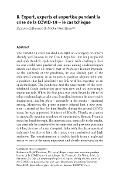Expert, experts et expertise pendant la crise de la COVID-19 – le cas tchèque
( Experts, experts and expertise during the COVID-19 crisis - the Czech case )

Autor
Premat, Christophe Emmanuel
Datum vydání
2024Publikováno v
Comparing the place of experts during the first waves of the COVID-19 pandemicNakladatel / Místo vydání
Stockholm University Press (Stockholm)ISBN / ISSN
ISBN: 978-91-7635-247-2ISSN: 2002-0724Informace o financování
MSM//LX22NPO5101
Metadata
Zobrazit celý záznamKolekce
Tato publikace má vydavatelskou verzi s DOI 10.16993/bco.i
Abstrakt
La crise de la COVID-19 a mis en lumière une catégorie d'experts déja bien connue en République tchèque, mais longtemps négligée et sous-financée : les épidémiologistes. Face a des défis que personne n'aurait pu prévoir, un nom parmi les épidémiologistes se détache de tous les autres : celui du professeur Roman Prymula. Au début de la pandémie, il faisait déja partie de la structure ministérielle, a un poste important (vice-ministre), un poste qui n'avait absolument aucun lien avec son expertise d'épidémiologiste. La pandémie et l'incertitude des autorités tchèques débordées lui ont donné un rôle nouveau et de plus en plus important. Une fois le premier pic passé, Prymula est parti pour laisser la place a d'autres épidémiologistes. Mais en réalité, il n'a jamais vraiment disparu et sa place, notamment dans les médias, est restée forte. D'ailleurs, le premier ministre lui a offert un nouveau poste - créé ad hoc pour lui. Finalement, lors de la deuxième vague COVID, il est nommé ministre de la Santé. Grâce a une série d'opportunités qui s'ouvrent progressivement, Roman Prymula fait sa percée. Son ascension fulgurante, notamment dans les médias, peut certes être attribuée a son expertise et a ses fonctions antérieures (militaire, directeur d'un hôpital public, liens avec l'industrie pharmaceutique), mais aussi a son style (strict, voire combatif) et a sa grande ambition. La transformation de la santé publique d'un secteur négligé en l'un des plus importants et des plus étroitement surveillés du système de santé n'est pas non plus a négliger. Bien que Prymula n'ait pas été le seul épidémiologiste en République tchèque, il était perçu comme un expert de premier plan, voire le seul. Un autre problème, moins personnel mais non moins important, est qu'en République tchèque, nous avons assisté a l'émergence de protestations contre les mesures strictes de confinement en cas de pandémie. Ces protestations émanent d'autres experts, notamment des médecins et des économistes. Cela soulève une ou plusieurs nouvelles questions : qui peut réellement être qualifié d'expert et sur quelle base, et qui est expert en quoi ? Plus généralement, l'objectif de ce chapitre n'est pas seulement de mettre en lumière l'ascension fulgurante d'un expert, mais aussi d'expliquer le contexte, a la fois politique et médico-épidémiologique, qui a rendu cette ascension possible.
The COVID-19 crisis has shed new light on a category of experts already well known in the Czech Republic, but long neglected and underfunded: epidemiologists. Faced with challenges that no one could have predicted, one name among epidemiologists stands out above all others: that of Professor Roman Prymula. At the outbreak of the pandemic, he was already part of the ministerial structure, in an important position (deputy minister), a position that had absolutely no link with his expertise as an epidemiologist. The pandemic and the uncertainty of the overwhelmed Czech authorities gave him new and an increasingly important role. When the first peak was over, Prymula left to let other epidemiologists take over. In reality, however, he never really disappeared, and his place - especially in the media - remained strong. Moreover, the prime minister offered him a new position - created ad hoc for him. Finally, during the second COVID wave, he was appointed Minister of Health. Thanks to a series of gradually opening windows of opportunity, Roman Prymula made his breakthrough. His meteoric rise, especially in the media, can certainly be attributed to his expertise and previous positions (soldier, director of a state hospital, links with the pharmaceutical industry), but also to his style (strict, even combative) and high ambition. The transformation of public health from a neglected sector to one of the most important and closely monitored in the health system is also not to be overlooked. Although Prymula was not the only epidemiologist in the Czech Republic, he was perceived as a leading, if not the only, expert. Another problem, less personal but no less important, is that in the Czech Republic we have seen the emergence of protests against the strict containment measures in the event of a pandemic. These protests are coming from other experts, particularly doctors and economists. This raises a new question(s): who can really be called an expert and on what basis, and who is an expert in what? More generally, the aim of the chapter is not only to highlight the meteoric rise of one expert, but also to explain the context, both political and medical-epidemiological, that made this rise possible.
Klíčová slova
public health management, expertise transformation, COVID-19 crisis, Roman Prymula, epidemiologists
Trvalý odkaz
https://hdl.handle.net/20.500.14178/2749Licence
Licence pro užití plného textu výsledku: Creative Commons Uveďte původ-Neužívejte dílo komerčně 4.0 International




